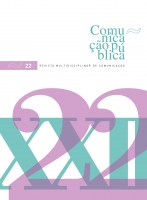From consumption to appropriation of MMORPGs
DOI:
https://doi.org/10.4000/cp.1359Keywords:
video games, MMORPGs, discussion forums, negotiationAbstract
This article seeks to identify and characterize some of the major changes that have led to the need to (re)think the role of the player regarding video games such as the Massively Multiplayer Online Role Playing Games (MMORPGs). Based on the criticism of the magic circle concept and on several theoretical contributions pointing out the MMORPGs as a space of negotiation that draws producers and consumers together (Jenkins, 2006; Steinkuehler, 2006; Klevjer, 2008; Consalvo, 2009; among others), we intend to demonstrate the molding to which this type of games are subjected, particularly in the video game World of Warcraft. A discussion forum of World of Warcraft was analyzed in order to highlight situations in which the negotiation of the game’s reality is present. Finally, we systematize the theoretical contributions and discuss the process underlying the molding of MMORPGs.
Downloads
References
Achterbosch, L.; Pierce, R. e Simmons, G. (2008). Massively Multiplayer Online Role-Playing Games: The past, present and future. ACM Computers in Entertainment, 5 (4): 1-33. DOI : 10.1145/1324198.1324207 good / bad
Ang, C. S., Zaphiris, P. e Wilson, S. (2010). Computer games and sociocultural play: An activity theoretical perspective. Games and Culture, 5 (4): 354-380.
Calleja, G. (2010). Digital games and escapism. Games and Culture, 5 (4): 335-353. DOI : 10.1177/1555412009360412 good / bad
Consalvo, M. (2009). There is no magic circle. Games and Culture, 4 (4): 408-417.
Dormans, J. (2006). On the Role of the Die: A brief ludologic study of pen-and-paper roleplaying games and their rules. Game Studies, 6 (1). [Internet] Diponível em: <http://gamestudies.org/0601/articles/dormans> [Consult. a 14 de Fevereiro de 2017].
Duggan, E. (2016). Squaring the (Magic) Circle: A Brief Definition and History of Pervasive Games. In: Nijholt, A. (ed.) (2017). Playable Cities: The City as a Digital Playground. Singapore, Springer: 111-135.
Fassone, R. (2015). This is video game play: Video games, authority and metacommunication. Comunicação e Sociedade, 27: 37-52.
Frissen, V. et al. (2015). Playful Identities: The Ludification of Media Cultures. Amsterdam: Amsterdam University Press. DOI : 10.5117/9789089646392 good / bad
Glas, R. (2013). Battlefields of Negotiation: Control, Agency, and Ownership in World of Warcraf. Amsterdam: Amsterdam University Press. DOI : 10.26530/OAPEN_437366 good / bad
Pérez, H. (2012). De perfiles y personajes: evolucíon de la representación del usuário en las redes sociales y los juegos de rol. Revista de Comunicación de la SEECI, Año XV (28): 30-48.
Huizinga, J. (2003). Homo Ludens. Lisboa: Edições 70.
Jenkins, H. (2006). Convergence Culture: Where Old and New Media Colide. New York and London: New York University Press. DOI : 10.7551/mitpress/9780262036016.003.0012 good / bad
Johnson, S. (2006). Tudo o que é Mau Faz Bem. Porto: Lua de papel.
Jordan, P. et al. (2016). Selling out the magic circle: free-to-play games and developer ethics. Proceedings of 1st International Joint Conference of DiGRA and FDG, 13 (1): 1-16.
Klevjer, R. (2008). The Cultural Value of Games: Computer Games and Cultural Policy in Europe. In: Ludes. P. (ed.) (2008) Convergence and Fragmentation: Media Technology and the Information Society. Bristol, Intellect Books: 71-90.
Kücklich, J. (2009). A techno-semiotic approach to cheating in computer games: Or how I learned to stop worrying and love the machine. Games and Culture, 4 (2): 158-169. DOI : 10.1177/1555412008325486 good / bad
Lange, P. G. (2010). Learning real-life lessons from online games. Games and Culture, 6 (1): 17-37. DOI : 10.1177/1555412010377320 good / bad
Malaby, T. M. (2007). Beyond Play: A new approach to games. Games and Culture, 2 (2): 95-113.
Pais, J. M. (1986). Paradigmas sociológicos na análise da vida quotidiana. Análise Social, 22 (90): 7-57.
Postigo, H. (2007). Of Mods and Modders: Chasing down the value of fan-based digital game modifications. Games and Culture, 2 (4): 300-313.
Postigo, H. (2008). Video game appropriation through modifications: Attitudes concerning intellectual property among modders and fans. Convergence: The International Journal of Research into New Media Technologies, 14 (1): 59-74.
Prax, P. (2015). Co-Creative game design in MMORPGs. Proceedings of DiGRA 2015: Diversity of play: Games – Cultures – Identities, 12: 1-18.
Raposo, R. e Morais, N. (2010). MMORPGs e culturas de convergência. Repositório Científico do Instituto Politécnico de Viseu. Departamento de Comunicação e Arte. [Internet] Disponível em <http://repositorio.ipv.pt/handle/10400.19/500> [Consult. 23 Fevereiro de2014].
Salen, K. e Zimmerman, E. (2004). Rules of Play: Game Design Fundamentals. Londres: The MIT Press Cambridge.
Sotamaa, O. (2010). When the game is not enough: motivations and practices among computer game modding culture. Games and Culture, 5 (3): 239-255. DOI : 10.1177/1555412009359765 good / bad
Steinkuehler, C. (2006). The mangle of play. Games and Culture, 1 (3): 199-213.
Stenros, J. (2014). In Defence of a Magic Circle: The social and mental boundaries of play. Transactions of Digital Games Research Association. DiGRA, 1 (2): 147-185.
Downloads
Published
Issue
Section
License
Copyright (c) 2017 Direitos do Autor (c) 2017

This work is licensed under a Creative Commons Attribution-NonCommercial 4.0 International License.
Os conteúdos da Comunicação Pública estão licenciados com uma licença Creative Commons - Atribuição-NãoComercial 4.0 Internacional.


